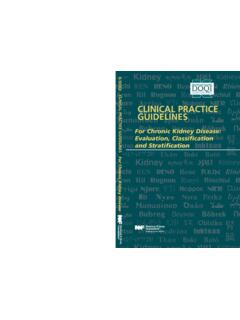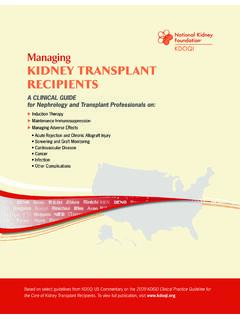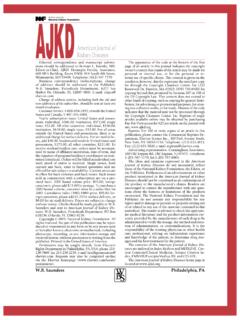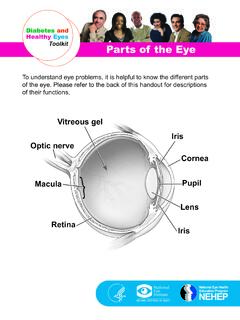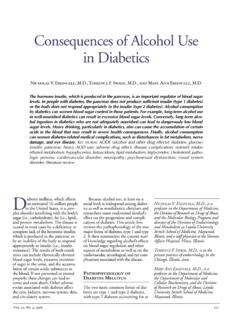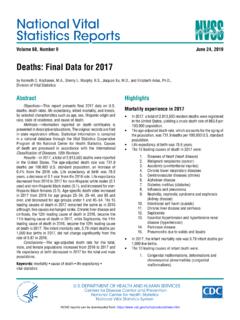Transcription of DIABETES AND CHRONIC KIDNEY DISEASE
1 AND CHRONICKIDNEY DISEASES tages 1 4 NATIONAL KIDNEY FOUNDATION2 National KIDNEY Foundation's KIDNEY DISEASE Outcomes Quality InitiativeDid you know that the National KIDNEY Foundation's KIDNEY DISEASE Outcomes Quality Initiative (NKF-KDOQI ) has guidelines and commentaries that help your doctor and healthcare team make important decisions about your medical treatment? The information in this booklet is based on the NKF-KDOQI recommended guidelines and is your stage of KIDNEY DISEASE ?There are 5 stages of KIDNEY DISEASE . They are shown in the table below. Your doctor determines your stage of KIDNEY DISEASE based on the presence of KIDNEY damage and your glomerular filtration rate (GFR), which is a measure of your level of KIDNEY function. Your treatment is based on your stage of KIDNEY DISEASE . Speak to your doctor if you have any questions about your stage of KIDNEY DISEASE or your OF KIDNEY DISEASES tageDescriptionGlomerular Filtration Rate (GFR)*1 KIDNEY damage ( , protein in the urine) with normal GFR90 or above2 KIDNEY damage with mild decrease in GFR60 to 893 Moderate decrease in GFR30 to 594 Severe reduction in GFR15 to 295 KIDNEY failureLess than 15*Your GFR number tells your doctor how much KIDNEY function you have.
2 As CHRONIC KIDNEY DISEASE progresses, your GFR number OF CONTENTSWhat is DIABETES ? ..4 Are there different types of DIABETES ? ..4 How does DIABETES affect my body? ..5 What is CHRONIC KIDNEY DISEASE ? ..6 Are people with DIABETES at greater risk for getting KIDNEY DISEASE ? ..6 What can people with DIABETES do to prevent KIDNEY DISEASE ? ..7 How does DIABETES harm the kidneys? ..7 How do I know if I have KIDNEY damage? ..9If I have KIDNEY damage, what can be done? ..9 What can be done to keep my kidneys working as long as possible? ..11 What about cholesterol and lipids? ..13 What about pregnancy? ..13 Key points to remember ..14 DIABETES : A growing epidemic ..15 Where can I get more information? ..16 NATIONAL KIDNEY FOUNDATION4 What is DIABETES ? DIABETES is a serious DISEASE . It occurs when your body does not make enough insulin or cannot use the insulin it makes.
3 Insulin is a hormone. It controls the amount of sugar (called glucose) in your blood. A high blood sugar level can cause problems in many parts of your there different types of DIABETES ?Yes. There are two main types: Type 1 diabetesIf you have this type of DIABETES , your body does not make insulin. It usually starts when you are a child or young adult, but it can occur at any age. It is treated by taking daily insulin shots or using an insulin pump and by following a special meal plan. About 5 to 10 percent of DIABETES cases are type 1. Type 2 diabetesIf you have this type of DIABETES , your body makes some insulin but cannot use it properly. Type 2 is partially preventable and is typically brought on by poor diet and lack of exercise. Very often heredity plays a part. It usually starts when you are over age 40, but it can happen earlier.
4 It is treated with exercise, weight loss, and special meal planning. People with type 2 DIABETES may need insulin, but in most cases medications given in pills (called hypoglycemics) are prescribed if diet and exercise alone do not control the DISEASE . Type 2 is the most common type of does DIABETES affect my body?When DIABETES is not well controlled, the sugar level in your blood goes up. This is called hyperglycemia. High blood sugar can cause damage to many parts of your body, especially: kidneys eyes heart feet blood vessels nervesDiabetes can also cause high blood pressure and hardening of the arteries (called arteriosclerosis). These can lead to heart and blood vessel KIDNEY FOUNDATION6 What is CHRONIC KIDNEY DISEASE ?Your kidneys are important because they keep the rest of your body in balance. They: Remove waste products from the body Balance the body s fluids Help keep blood pressure under control Keep bones healthy Help make red blood KIDNEY DISEASE (CKD) means that the kidneys have been damaged.
5 Kidneys can get damaged from a physical injury or a DISEASE like DIABETES or high blood pressure. Once your kidneys are damaged, they cannot filter your blood or do other jobs as well as they should. There are five stages of KIDNEY DISEASE (see page 10). Treatment in the early stages can help keep KIDNEY DISEASE from getting people with DIABETES at greater risk for getting KIDNEY DISEASE ?Yes. About a third of people with DIABETES may get CHRONIC KIDNEY DISEASE . Certain groups may have a higher risk of getting KIDNEY DISEASE than others. Your risk may be greater if you: Are age 60 or older Have high blood pressure Have a family member who has KIDNEY failure Are African American, Hispanic, Asian, Pacific Islander or American can people with DIABETES do to prevent KIDNEY DISEASE ?Many people with DIABETES do not get KIDNEY DISEASE or KIDNEY failure.
6 Talk to your doctor about your chances of getting KIDNEY DISEASE . The best way to prevent getting KIDNEY DISEASE from DIABETES is to: Control your blood sugar level Keep blood pressure under control Ask your doctor to test you for KIDNEY DISEASE at least once each year Take medicines to help control your blood glucose, cholesterol, and blood pressure if your doctor orders them for you Follow your diet for DIABETES Get regular exercise Avoid alcohol Do not smoke See your doctor as often as you are toldHow does DIABETES harm the kidneys? DIABETES can harm the kidneys by causing damage to: Blood vessels in the kidneysThe filtering units of the KIDNEY are filled with tiny blood vessels. Over time, high sugar levels in the blood can cause these vessels to become narrow and clogged. Without enough blood, the kidneys become damaged and albumin (a type of protein) passes through these filters and ends up in the urine where it should not KIDNEY FOUNDATION8 Nerves in your bodyDiabetes can also cause damage to the nerves in your body.
7 Nerves carry messages between your brain and all other parts of your body, including your bladder. They let your brain know when your bladder is full. But if the nerves of the bladder are damaged, you may not be able to feel when your bladder is full. The pressure from a full bladder can damage your kidneys. Urinary tractIf urine stays in your bladder for a long time, you may get a urinary tract infection. This is because of bacteria. Bacteria are tiny organisms like germs that can cause DISEASE . They grow rapidly in urine with a high sugar level. Most often these infections affect the bladder, but they can sometimes spread to the do I know if I have KIDNEY damage?Most people with early KIDNEY damage do not have symptoms. The best way to find early KIDNEY damage is to have a urine test once a year. This test checks for very small amounts of protein in the urine called microalbuminuria.
8 It helps show KIDNEY damage at an early stage in people with everyone with KIDNEY DISEASE gets KIDNEY failure. With the right treatment, you can prevent KIDNEY DISEASE from getting I have KIDNEY damage, what can be done?First, your doctor needs to find out how well your kidneys are working. This will help in determining the best treatment for you. Your doctor will start by: Determining your GFR (glomerular filtration rate)GFR is the best way to find out how well your kidneys are working. Your doctor will begin by testing your blood for a waste product called creatinine. When the kidneys are damaged, they have trouble removing creatinine from your blood. Creatinine is stored in muscle tissue and blood. The blood test for creatinine will help your doctor find out how well your kidneys are working. But it is only the first , your doctor or lab will take the result of this test and put it into a math formula that includes your age, race, and sex.
9 The number that results from this math formula is called your GFR (glomerular filtration rate). It tells your doctor how well your kidneys are working. You should have this test at least once a KIDNEY FOUNDATION10 Once your GFR is known, your doctor can tell which stage of KIDNEY DISEASE you have. There are five stages of KIDNEY DISEASE (see the chart below). Your treatment will depend on your stage of KIDNEY OF KIDNEY DISEASES tageDescriptionGlomerular Filtration Rate (GFR)*1 KIDNEY damage ( , protein in the urine) with normal GFR90 or above2 KIDNEY damage with mild decrease in GFR60 to 893 Moderate decrease in GFR30 to 594 Severe reduction in GFR15 to 295 KIDNEY failureLess than 15*Your GFR number tells your doctor how much KIDNEY function you have. As CHRONIC KIDNEY DISEASE progresses, your GFR number decreases. Ordering a KIDNEY biopsy if neededYour doctor may also order a KIDNEY biopsy.
10 This can help your doctor find the main cause of your KIDNEY DISEASE . Not all KIDNEY damage is caused by DIABETES . Other diseases can be involved. If your KIDNEY DISEASE is caused by DIABETES , it is called diabetic KIDNEY doctor will begin treatment based on the stage of KIDNEY DISEASE you have and what caused it. With the right treatment, you and your doctor can keep your kidneys working as long as can be done to keep my kidneys working as long as possible?Your doctor should plan your treatment with you and your family. Some patients may be asked to see a KIDNEY doctor, called a nephrologist. A dietitian may be helpful too. The following things can help your kidneys work better and last longer: Controlling your blood sugarThe best way to prevent or slow KIDNEY damage is to keep your blood sugar well controlled. This is usually done with diet, exercise, and, if needed, insulin or hypoglycemic pills (to lower your blood sugar level).



